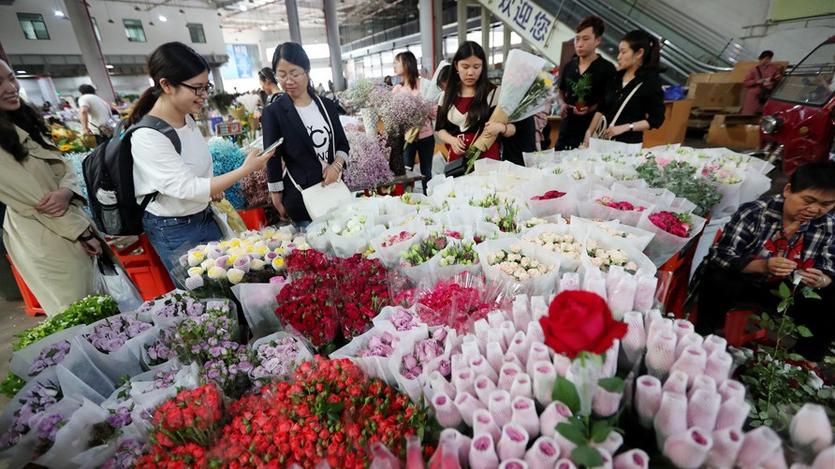Fresh produce, flowers from south easily available during cold winter in the north
 A female consumer scans a QR code using her smartphone, to pay for flowers she selected in a flower market in Kunming, Yunnan province. (YANG ZHENG / FOR CHINA DAILY)
A female consumer scans a QR code using her smartphone, to pay for flowers she selected in a flower market in Kunming, Yunnan province. (YANG ZHENG / FOR CHINA DAILY)
As Spring Festival draws near, Liu Guifang, a 48-year-old housewife in Tianjin, has been busy preparing for the family feast on Lunar New Year's Eve by spicing up the meal with her newly acquired Thai cooking skills.
Her recipes' heavy reliance on fruits and vegetables grown in southern China was her biggest concern. However, she found all the tropical products on her long shopping list at a wholesale produce market near her apartment.
"I was surprised by the greater variety of vegetables during winter in northern China," she said. "With fast freight train transportation, it's now not difficult to find fruits and vegetables we hadn't even heard of a decade ago."
Thanks to the country's rapidly expanding railway network and its highly efficient and low-cost rail cargo service, local produce from every corner of the country, from iceberg lettuce to celery and even the exotic sounding monkey-head mushroom, can now easily be found in northern China during winter.
Zhang Xiaodong, a professor of rail transportation economics at Beijing Jiaotong University, said that as the winter in northern China is typically cold and dry, unlike in the south, residents previously had little access to fresh vegetables after early November.
The rapid expansion of the railway network in recent decades has improved connectivity across the country, Zhang said. While passenger services made it easier for people to return home during the holiday, cargo services-an alternative to slower and riskier ocean shipping and costlier air cargo-had sped up the flow of goods, he added.
In southern China's Guangxi Zhuang autonomous region, Baise-a city known for a wealth of delicious tropical fruits and vegetables, including mango and dragon fruit-has been shipping local produce to Beijing and nearby northern cities by railway since 2013.
"The train uses international standard cold-chain containers and GPS service and remotely controls humidity and temperature to keep the fruits and vegetables fresh after the three-day trip," said He Yongchen, general manager of the No 1 Agricultural Development Co in Baise.
Road transport, which the company previously used, was often delayed by poor weather and traffic congestion and became significantly more expensive during the peak season, he said, adding that rail freight enabled delivery times to be reduced by at least a third.
The railway authority in Guangxi said 112 freight train services had carried 40,000 metric tons of agricultural products, including bananas and cherry tomatoes, to the capital over the past six years. It will add more trains during Spring Festival.
High-speed trains have also made it easier for people to buy flowers from southwestern China's Yunnan province for Spring Festival, when demand soars as families celebrate the most important holiday of the year.
Zhu Yongmeng, manager of the Dounan Flower Market in Kunming, capital of Yunnan province, said the flower business was prospering thanks to the development of the country's high-speed train network. The city was now connected to almost everywhere in China, giving a boost to flower sales, especially during holidays.
"Fresh flowers are very hard to preserve for a long time. The high-speed trains allow us to ship flowers to other places very quickly," he said. "Our flowers will decorate many more families' homes this year."


